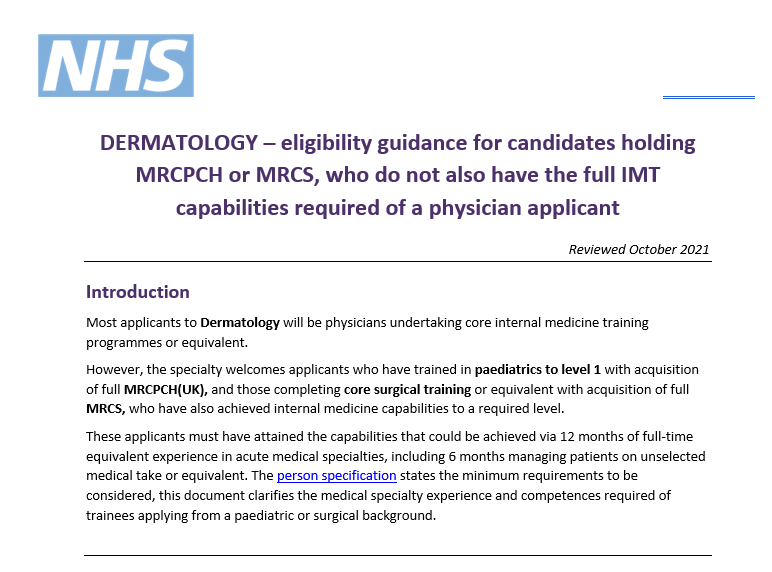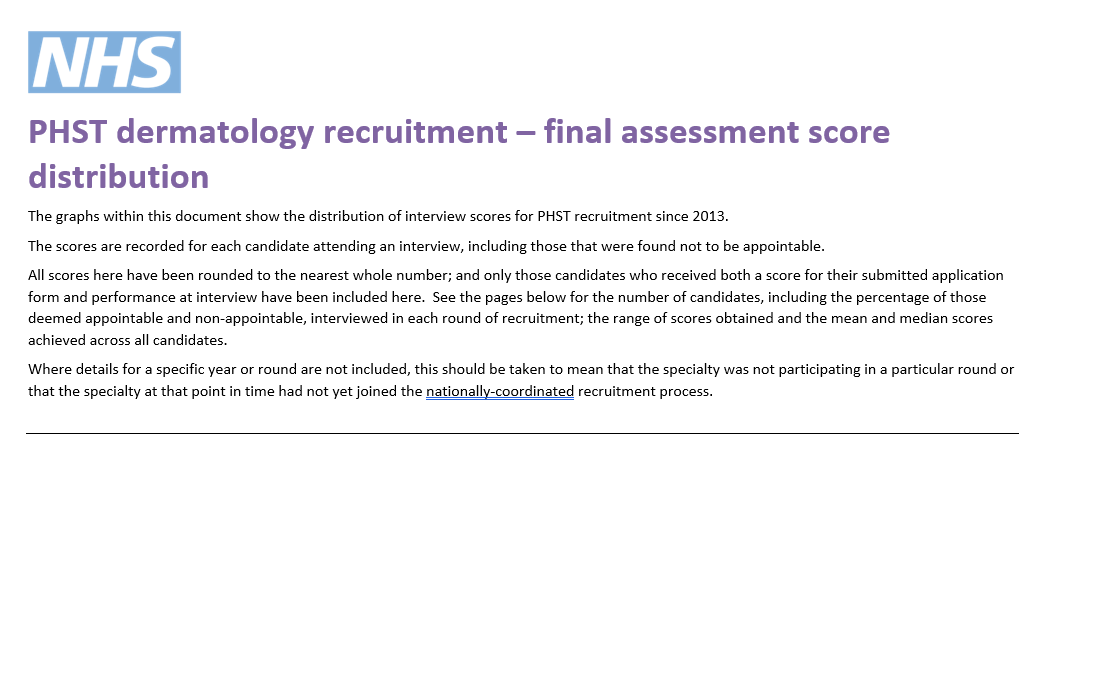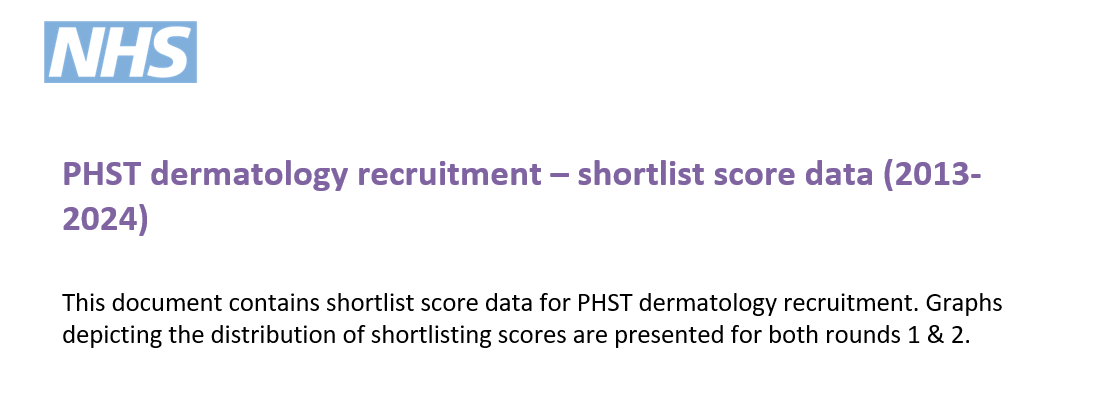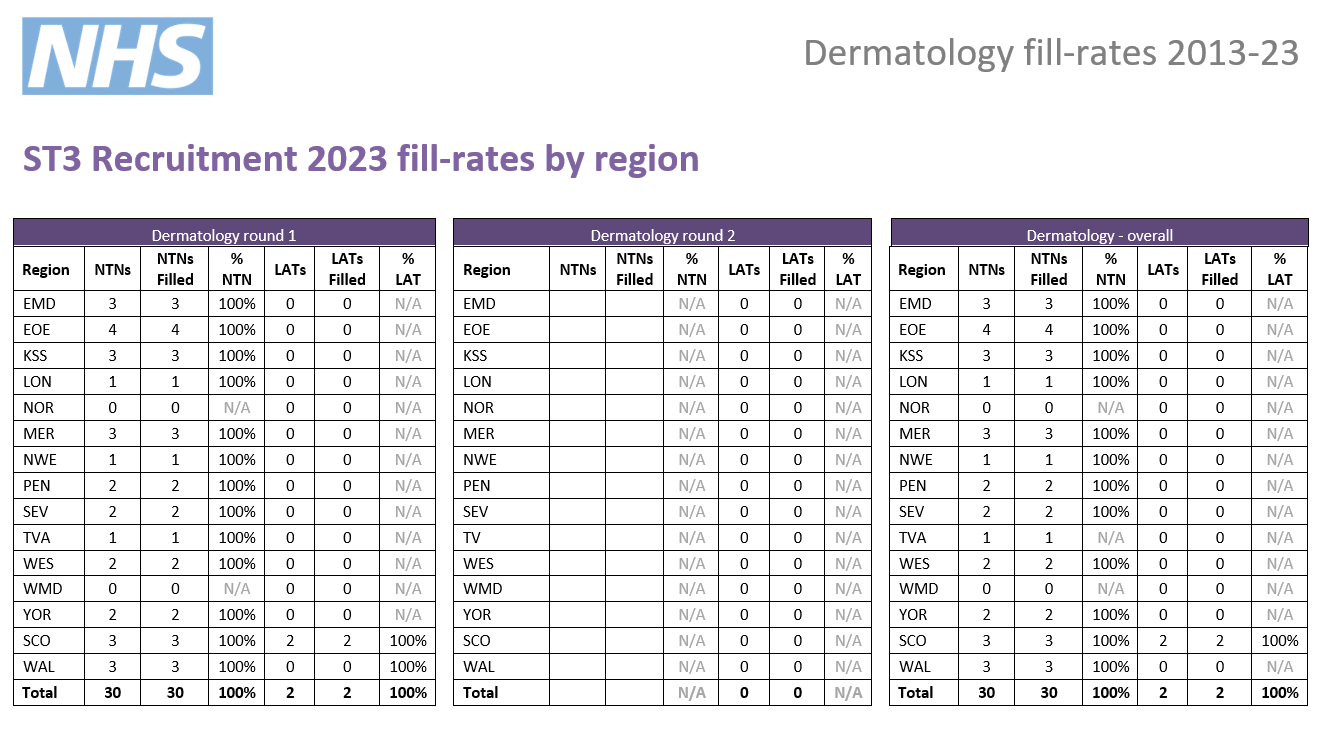It is currently an excellent time to consider a career in dermatology.
This is a far-ranging specialty, covering skin diseases, cancer and surgery in children and adults.
There are excellent career opportunities to sub-specialise and currently many consultant vacancies in the UK.
Dermatology - trainee characteristics
Dermatology will particularly suit trainees who are
-
able to deal with many possible diagnoses ( >2,000!)
-
excellent pattern recognition and integrated clinical skills
-
excellent hand-eye coordination
-
confident in making quick and accurate clinical decisions.
Summary of the specialty
Training in dermatology provides time for critical appraisal, analysis and academic development, which is not always available in other specialties. It also provides exposure to skin diseases and their interface with adult and paediatric medicine.
Broad scope and remit
Dermatology is an exciting and tremendously varied specialty.
The core role of a dermatologist is to improve the care of patients with skin disorders; and this will range from a neonate born with a genetic disorder or infection through to an elderly person with skin cancer.
The specialty has a wide remit, with over 2,000 possible diagnoses. However, with recent advances in medicine more people can be treated for chronic diseases, so that their illness is controlled; and this makes the specialty particularly rewarding.
Interface with other specialties
Dermatology interfaces with many other branches of medicine and surgery, such as paediatrics, plastic surgery, immunology, rheumatology, general medicine, allergy, etc.
This wide remit combines clinical practice with development and implementation of new therapies, training and teaching of current and future innovations, as well as the promotion of evidence-based practise.
We strongly encourage out-of-programme degrees in research or medical education.
A career in dermatology
It is currently an excellent time to consider dermatology as a career, as there is a shortfall of approximately 100 consultant posts.
There are also exciting developments in skin cancer care pathways, and the advances and use of systemic therapies, such as biological therapies in the management of psoriasis.
Further information
General / application queries
For general queries relating to areas such as eligibility criteria, making an application or the Oriel system, please contact the Physician Specialty Recruitment Office.
Queries regarding the progress of a submitted application should be directed to the lead recruiter for this specialty. The lead recruiter for dermatology is North West.
| Dermatology North West | ||||||
|---|---|---|---|---|---|---|
| Postal address |
3rd Floor 3 Piccadilly Place Manchester |
|||||
| email address & regional contact | [email protected] | |||||
| website | http://www.nwpgmd.nhs.uk/ | |||||
Group 2 specialty
This is a Group 2 specialty and requires completion of the first two years of the internal medicine training (IMT) stage 1 programme or equivalent. Please visit the am I eligible? section of this website for further information about the eligibility criteria for Group 2 specialties.
Non-medicine training pathways
In addition to physician training, the specialty also accepts applicants from paediatric and core surgical training routes.
Non-medicine applicants must obtain the relevant specialty membership professional examination in addition to specific clinical experience and capabilities to be eligible. However, it is also a requirement for dermatology applicants from these pathways to have specific physician experience and capability.
The specialty's person specification summarises the requirements and by when they must be achieved. We have produced a guidance document below which gives detailed instructions about the specific experience and capability required of non-physician trainee applicants and how this is demonstrated. All trainees applying from this pathway should read the document before applying to ensure they know what they need to do.
Non-medicine applicants will need to supply the ‘Alternative Certificate to Enter Group 2 Higher Physician Specialty Training’, alongside evidence of their capability from paediatrics/surgery. Paediatric/surgical capability will need to be demonstrated by the deadline indicated in the person specification. The Group 2 alternative certificate is required at time of application.
Commitment to specialty
The specialty will not be assessing your commitment to specialty as part of the shortlisting process and will score your application purely via the self-assessment scoring framework. Commitment to specialty will be assessed as part of the interview.
As part of the process of applying to HST, you may wish to gain an idea of how recruitment progressed in previous years for the various specialties participating in the nationally-coordinated recruitment.
To this end, we have published data dating back to 2013 (where this is available), based around four main areas:
-
Competition ratios - application numbers submitted to each specialty, along with the number of NTN and LAT posts available in each. It is worth noting that posts are subject to change throughout the round (increasing on average between 20-40%), and post numbers for this data are taken at the end of the round.
-
Shortlist scores - the scores awarded to all submitted applications, including average scores and distribution nationally.
-
Total scores - the total score awarded to all candidates who completed the full recruitment process for a specialty (application and interview), including some analysis of scores.
-
Post fill rates - the number of posts filled by region.
We have published information for all specialties participating in our process that year; consequently not all specialties will have data in all cases.
Round 1
| Year | Apps. | NTN posts | LAT posts | Total posts | Comp. | Unique* |
|---|---|---|---|---|---|---|
| 2023 | 241 | 30 | 2 | 32 | 7.5 | 75% |
| 2022 | 224 | 38 | 2 | 40 | 5.6 | 74% |
| 2021 | 178 | 28 | 0 | 28 | 6.4 | N/A** |
| 2020 | 166 | 41 | 1 | 42 | 4.0 | 79% |
| 2019 | 132 | 36 | 1 | 37 | 3.6 | 85% |
| 2018 | 150 | 51 | 1 | 52 | 2.9 | 80% |
| 2017 | 156 | 31 | 0 | 31 | 5.0 | 74% |
| 2016 | 158 | 35 | 4 | 39 | 4.1 | 74% |
| 2015 | 168 | 30 | 12 | 42 | 4.0 | 79% |
* the percentage of unique candidates that only applied to this specialty (out of the PSRO-coordinated specialties)
** As many specialties did not participate in recruitment in 2021, the data is not comparable.
Round 2
| Year | Apps. | NTN posts | LAT posts | Total posts | Comp. |
|---|---|---|---|---|---|
| 2023 | |||||
| 2022 | 115 | 18 | 0 | 18 | 6.3 |
| 2021 | 115 | 14 | 0 | 14 | 8.2 |
| 2020 | 96 | 11 | 0 | 11 | 8.7 |
| 2019 | 52 | 13 | 1 | 14 | 3.7 |
| 2018 | 48 | 14 | 0 | 0 | 3.4 |
| 2017 | 69 | 15 | 0 | 15 | 4.6 |
| 2016 | 72 | 14 | 0 | 14 | 5.1 |
| 2015 | 87 | 19 | 0 | 19 | 4.6 |
Indicative post numbers
Indicative vacancy numbers are available in the table below, broken down by region and divided between substantive national training number (NTN) and locum appointment for training (LAT) posts. In many cases these will be presented as a range (e.g. 1-4) as it is not always possible for regions to know at this stage how many vacancies there will be.
It is the intention that indicative post numbers for all regions will be published prior to the application opening date, although this cannot be guaranteed. Please note that this table is not likely to be updated subsequent to indicative numbers and actual numbers will be confirmed when programme preferences are opened later in the round.
Numbers subject to change
Please be aware that it is not uncommon for vacancy numbers to change as the round progresses.
More commonly, post vacancy numbers can increase as the round goes on (and confirmation of posts becomes available); but it is also possible that numbers can reduce as well. In the past, post numbers have risen an average of 20-40% from the start to the finish of the round but this can vary greatly for individual specialty/region combinations.
It is possible that regions which do not have a post at the start of the round may declare one after applications have closed. Whilst we try and minimise instances of this, it is not always possible to predict vacancies so even if there appears not to be a vacancy in your preferred specialty/region combination, you may wish to consider applying in case one becomes available during the round; you can check with the region concerned if you wish to check on the likelihood of a post arising.
Generally, once a region enter a post into a round they would always have at least one post available and would only withdraw it in exceptional circumstances.
Round 1 Interview dates & posts
| Region | NTN posts | LAT posts* | Evidence upload date(s) | Interview date(s) |
|---|---|---|---|---|
| East Midlands | 3 | N/A |
02/02/24 - 12/02/24 |
26, 27, 28 March 2024 |
| East of England | 0 - 3 | N/A | ||
|
London |
North 2 - 5 South 0 - 4 |
N/A | ||
| Kent, Surrey and Sussex | 0 - 1 | N/A | ||
| North East | 0 - 2 | N/A | ||
|
North West |
Mersey TBC |
N/A | ||
|
North Western TBC |
N/A | |||
|
South West |
Peninsula 0 - 1 |
N/A | ||
|
Severn 0 - 2 |
N/A | |||
| Thames Valley | 1 - 3 | N/A | ||
| Wessex | 0 - 3 | N/A | ||
| West Midlands | 4 - 7 | N/A | ||
| Yorkshire & Humber | TBC | N/A | ||
| Scotland** | 1 - 7 | TBC | ||
| Wales | TBC | TBC |
*English LATs
Please note, English regions do not recruit to LAT posts.
**Scotland post numbers
If you are interested in working in Scotland, a breakdown of post numbers by the four Scottish regions is available on the Scottish Medical Training website. This has details of all specialty training post numbers in Scotland, including specialties which are not part of the nationally-coordinated process.
The SMT website will always be the more accurate one where they differ.
Interview content
The interview will be split across three stations with a separate pair of interviewers scoring you on the areas in their station. There will be three questions which are 7 minutes in length. You will be marked on these questions and your communication skills, giving four scored areas in total. The headings below show the question areas and in which station they will be covered, along with information about what will be assessed.
Each station will last 7 minutes so, including the time between stations, the interview will be approximately 30-35 minutes.
Please note that this is subject to change and will be confirmed by the date of interview.
Your understanding of research/academic medicine issues will be assessed via the use of an abstract which will be provided to you for a short time to consider before starting the question.
Upon receiving the document, read it in full and then consider the main points, important areas, potential application of any findings; and be critical in your analysis.
Following the time to review the abstract, discussion will last for approximately 7 minutes.
At the start of this question you will read a clinical situation to consider. Interviewers will provide you with some information about a patient to ask for your initial response and will follow this up with a series of follow-on probes relating to the diagnosis and management of this case. This question will last approximately 7 minutes.
Clinical scenario considerations
The scenario will describe a hypothetical clinical situation which has arisen in which you are, or have become, involved. Some points to consider when reviewing the scenario and preparing for discussion are:
- what steps you would take
- any potential treatments possible
- any further information you would gather
- how you would go about communicating with any people (eg patients, family members, colleagues) involved in the scenario
You should also consider any other factors you deem appropriate, using your experience and professional judgement.
Areas for assessment
One mark will be awarded to you based on your suggestions and responses to the clinical scenario. The second mark will be on the communication skills you display.
This will be both an assessment of how you would communicate with patients, colleagues, etc. in the scenario, as well as of how well you communicate with interviewers.
This question will focus on your suitability for and commitment to training in the specialty and give you opportunity to expand on the information provided in your application form.
This question will last approximately 7 minutes.
Scoring framework
The score of 1-5 an interviewer will award you for each assessment area is judged in relation to how well you perform against an expected level. Below is the framework used to award scores at interview, as well as interpretation of what these scores represent:
|
Mark
|
Rating
|
Assessment
|
|
1 |
poor |
not considered appointable |
|
2 |
area for concern |
performed below the level expected from a core level trainee applying to the specialty; |
|
3 |
satisfactory |
performed at the level expected of a core level trainee applying to the specialty; |
|
4 |
good |
above average ability; |
|
5 |
excellent |
highly performing trainee; |
As shown in the table, for each of the question areas at interview, 3/5 is considered a satisfactory score; and reflects the level of performance that would be expected of a trainee ready to progress to a specialty training programme.
Should your performance go above and beyond this expected level, interviewers can award marks of 4/5 or 5/5 as appropriate.
Conversely, should your interview performance not reach the expected level, then interviewers can award marks of 1/5 or 2/5, as reflects their level of concern over your performance.
Appointability
Raw interview score (RIS)
The RIS is the sum of all eight scores awarded to you during your interview, but before any weighting is applied.
As each individual score will be between 1 and 5, your RIS will be between 8 and 40.
Appointability requirements
To be classed as 'appointable', you must meet all three criteria below:
- none of your eight interview scores can be 1/5
- no more than two of your eight interview scores can be 2/5
- your RIS must be 24 or above.
If you meet all three requirements, your application will be assessed as appointable, and can progress to be considered for post offers.
However, if you fail to meet any of these requirements, your application must then be assessed as not appointable, and it will progress no further in that round.
Total score
After interview, a weighting is applied to the scores in each area, as well as your application score.
These scores are then combined to give your total score which determines your ranking, which will in turn be used to inform how offers are made. The weighting of different sections, as well as the method by which your total score is established, is detailed in the table accessible through the link below:
|
|
Interviewer 1
|
Interviewer 2
|
Weighting
|
Max score
|
|
Station 1 |
||||
|
Research / academic |
/ 5 |
/ 5 |
2.5 |
25 |
|
Station 2 |
||||
|
Clinical scenario |
/ 5 |
/ 5 |
1.8 |
18 |
|
Communication mark |
/ 5 |
/ 5 |
1.2 |
12 |
|
Station 3 |
||||
|
Suitability and commitment |
/ 5 |
/ 5 |
2.5 |
25 |
|
|
|
|||
|
Raw interview score |
/ 40 |
|||
|
Interview score (w weighting) |
/ 80 |
|||
|
Application score |
/ 50 |
0.4 |
/ 20 |
|
|
Total score |
/ 100 |
|||





